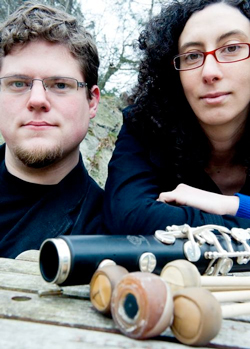by Nicholas Stevens

For their November 21 concert in the Cirigliano Studio Theatre, titled “Looking Forward, Looking Back,” the duo took on nostalgia as a guiding concept. Even the two halves of the program had themes, the first branded “intellectual” and the latter “emotional.” Advocat and Sharrock made for disarming presenters, sharing sophisticated thoughts even as they reset and readjusted between pieces. They acknowledged and took full advantage of the venue’s inherent intimacy on Tuesday, speaking with casual intelligence.
Transient Canvas also excelled at musical communication. No introductory throwaway, Jonathan Bailey Holland’s Rebounds (2016) opened the concert, leading listeners both through motion and gorgeous lyrical writing. Emily Koh’s brilliant \very/ specifically vague (2017) promises a depiction of roundabout conversation — and trading snippets of material, the duo maintained a dialogue that grew heated at moments but remained productive.
With themes of environmental catastrophe and human brain function, combined with movement titles packed with such adjectives as gelid, chiral, and albescent, Clifton Ingram’s Cold column, calving (2016) threatens to come across as a bit too clever. Transient Canvas dispelled this possibility with a poignant performance, haunting in its evocation of the effects of climate change. The broken, wordless lament that concludes the piece comes as a surprise: not the aria that our society asks for, but one that we deserve.
The piece that Sharrock likened to a gargantuan canvas made a more modest impression. David Coll’s Caldera (2016) came across as a mysterious object rather than a monument. Dominated by pops, clicks, and tones delivered at full volume through instruments partly covered in aluminum foil, the composition allowed the players’ adventuresome spirits to shine through.
Eschewing an intermission, the duo moved on to the “emotion” half of the evening with Beau Kenyon’s to look at you dance and smile, to listen to you sing and then laugh (2015). A deconstruction of singer-songwriter Jacques Brel’s Ne me quitte pas, the piece never quotes the tune for more than a few notes, but does dance around its characteristic flourishes. Kenyon often allows the instruments to drift into the hierarchy typical for a wind instrument and a chord-capable one — melody and accompaniment — but then disrupts that balance.
The program closed with its longest work, Nostalgia Variations (2015) by Adam Roberts. True to its title, Roberts’s piece subjects an opening melody to transformations. At one point, a tremolo between adjacent notes on the low end of the marimba evokes the rumble of a distant train. Advocat and Sharrock offered to greet attendees after the concert, capping a thrilling yet intimate performance with yet another gesture of welcome and approachability.
Published on ClevelandClassical.com November 27, 2017.
Click here for a printable copy of this article



